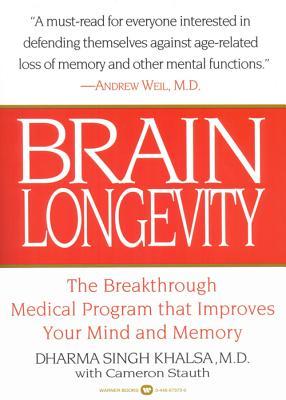
Brain Longevity
The Breakthrough Medical Program that Improves Your Mind and Memory
رشد برنامه پزشکی که ذهن و حافظه شما را تقویت میکند
کتاب های مرتبط
- اطلاعات
- نقد و بررسی
- دیدگاه کاربران
نقد و بررسی

April 28, 1997
Deepak Chopra, Andrew Weil and... Dharma Singh Khalsa? Warner is betting on this little-known physician, a graduate from Creighton Univ. School of Medicine, as the next big healer. Judging by Khalsa's first book, that's not a bad wager. Khalsa works out of the increasingly popular field of complementary medicine--combining Western orthodox with alternative, usually Eastern, methods of healing--and has a charming bookside manner, in part courtesy of veteran health journalist Stauth. He also aims his message at the huge book-buying readership of baby boomers, and isn't afraid to make jaw-dropping claims: "I believe that Alzheimer's disease can be delayed and prevented. I believe that age-associated memory impairment can be eradicated." He also says that he has helped people with very mild or no cognitive impairment "to develop super minds.'" Khalsa attributes much of his alleged success to his lowering of levels in patients of the hormone cortisol, which is secreted in response to stress and which he says is toxic to the brain. To support and complement this lowering, he advises what looks like a wonderfully sensible regimen of diet, exercise and meditation that incorporates many principles of Yoga. Diagrammed mind-body exercises are included, and the book wraps up with a concise program, "Forty Days to a Better Brain." Whether or not readers will, or can, find themselves fulfilling Khalsa's claims, there's little doubt that they will find in his book an accessible, smart and expertly packaged guide to living a healthier life. 100,000 first printing; major ad/promo; BOMC, QPB, One Spirit and Money Book Club selections; simultaneous Time Warner audio; foreign rights sold in the U.K., Brazil, Israel, Spain and Latin America.

May 1, 1997
Khalsa believes that the excess production of cortisol, a hormone secreted by the adrenal gland, causes much of the deterioration exhibited by his patients, who suffer from Alzheimer's and age-associated memory impairment. He also believes that these conditions can be prevented or delayed with aggressive intervention. An anesthesiologist and former director of the University of Arizona's Acupuncture, Stress Medicine and Chronic Pain program, Khalsa advocates a multimodal approach that incorporates traditional with alternative therapies, emphasizing nutrition (with hefty doses of vitamins and minerals), stress management, mental and physical exercise, and prescription drugs. He describes the research supporting his methods and offers anecdotal evidence of their efficacy. Despite a tendency to hyperbole, this book is recommended for public libraries, where it should be quite popular.--Laurie Bartolini, Legislative Research Unit, Springfield, Ill.

April 1, 1997
Now, those seeking to restore faded powers (listen up, baby boomers) have a trio of brand-new advisers on doing just that. Weil's "Eight Weeks to Optimum Health" tells how to improve general health, Klatz and Kahn's "Grow Young with HGH" tells how to delay and reverse the effects of aging, and anesthesiologist-gerontologist Khalsa and journalist Stauth tell how to tone a sagging mind and stave off that curse of long life, Alzheimer's disease. Like fellow physicians Weil and Klatz, Khalsa proffers a program--brain-longevity therapy. Like Klatz, he targets a particular cause of the deterioration that his scheme addresses. But while too little human growth hormone gives rise to the problems Klatz addresses, too much of the hormone cortisol, produced by the body in response to stress and linked to brain damage, causes memory loss and lassitude in particular. Unsurprisingly, stress reduction is one of four basics of Khalsa's program, the others being nutritional therapy, mental and physical exercise, and, when clearly necessary, pharmacology (hormone therapy ala Klatz). Before expounding the program, Khalsa and Stauth explain the development of brain-longevity therapy and how the brain works in health and in sickness, especially Alzheimer's. Fascinating and, Warner hopes (it has scheduled a 100,000-copy first printing), magnetically appealing. ((Reviewed April 1, 1997))(Reprinted with permission of Booklist, copyright 1997, American Library Association.)

























دیدگاه کاربران